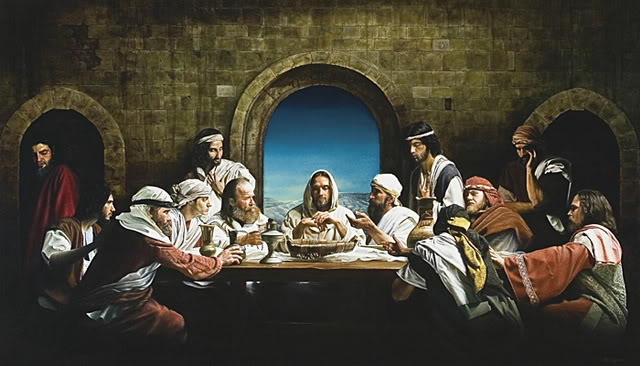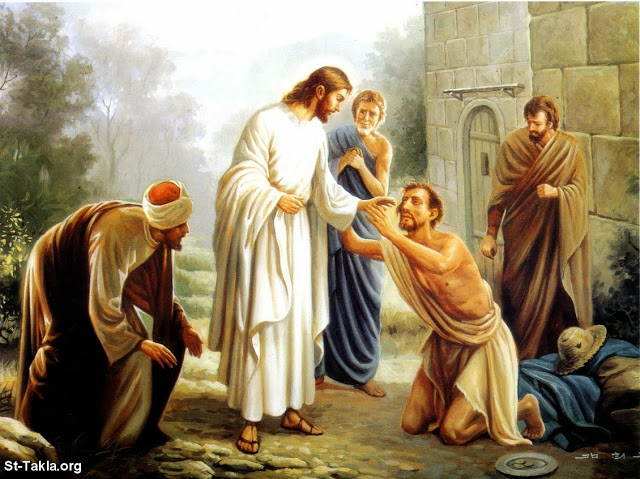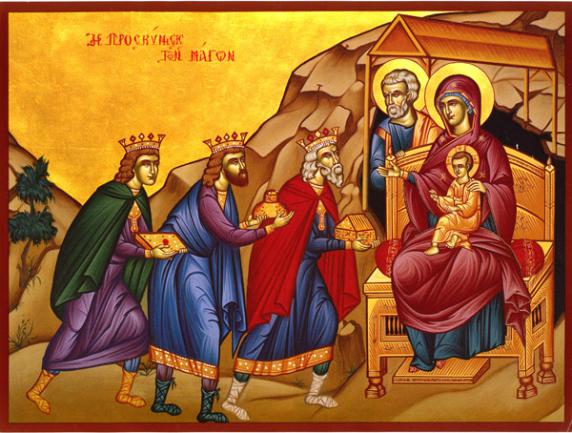Today’s readings
I don’t know about you, but I feel like today’s Liturgy of the Word starts off by giving us all a slap in the face. And it’s needed. How many of us judge others without even getting to know them? How often do we decide who people are and what they’re like just by a first glance, or where they live, or even who they know? It’s a habit we learned in junior high school, or maybe even earlier, and we never seem to outgrow it. Shame on us for that, because God is clear with Samuel: “Not as man sees does God see, because man sees the appearance, but the LORD looks into the heart.” So we have to stop judging others before we get to know them; we have to learn to see them as God sees them. We need to see with the eyes of God.
Whenever I hear this reading, I think of my dad. He was the typical Irish guy who never met a stranger, and it was frankly a little irritating to go grocery shopping with him. He’d bump in to a couple of people he knew while we were shopping, one or two more in the checkout line, and probably at least one more while the rest of us were loading the groceries in the car! But that was because dad was a man who always seemed to see the best in people. At his wake a few years ago now, we were all overwhelmed by the incredible number of people who came and shared with us how they were inspired by him and encouraged by him, all because Dad saw something special in them. I think dad had some inkling of the vision God wants us to have in this first reading.
So the theme for this week’s liturgy is vision and light. The gospel gets at that pretty quickly, healing the man born blind in the first couple of minutes of what is admittedly a pretty long reading. And that’s a good thing because, honestly, who cares about the man born blind? I know that sounds terrible, but he lived a couple thousand years ago, and he was healed, so you know, good for him, but how does that affect us? I’ll tell you how it affects us: the man born blind is us. We all have affected vision: that’s why the first reading is such a slap in our faces. So we have to decide today if we are the man born blind who is easily and quickly healed, or if we want to be the Pharisees who, at the end of the day, never regain their sight because they just don’t want to.
So maybe you’re asking the same question those Pharisees asked, “surely we are not also blind, are we?” Of course we are. That’s why we have Lent: to realize our brokenness and to accept the healing power of Christ. Lent calls us to remember that we are dust, that we are broken people fallen into sin, but that none of that is any match for the power of Christ risen from the dead, if we just let him put a little clay on our eyes.
Today’s Gospel then is a kind of journey to clearer vision. We are all born blind, in a sense, and it takes the presence of Jesus to clear our vision. Just as the man born blind was sent to the pool of Siloam, we too are sent to the waters of baptism, which clears our eyes and helps us to really see. In baptism, the darkness of life is transformed by the presence of Christ, the Light of the World. During the course of all the questionings that follow, the man’s vision becomes clearer and clearer. At first he doesn’t know who Jesus is or where to find him. Later on he testifies that Jesus is a prophet and finally, with the help of Jesus’ instruction, that Jesus is the Son of Man and worthy of worship. We make this same journey ourselves. From the waters of baptism, we need to continue the conversation and return to Christ again and again to grow in our faith. We grow in the way that we see Jesus through our lives. Our faith when we were young is not the same faith that works for us later in life. At one point Jesus is a friend walking with us on life’s path; later on he might be a rock that helps us in a particularly stormy time of life. Still later, he might be the one calling us to become something new, something better than we think we can attain. Jesus is always the same, but we are different, and Jesus is with us at every point of life’s journey, if we open our eyes to see him.
Traditionally, today is Laetare Sunday – laetare being Latin for “rejoice.” That’s why we’re wearing these rose-colored vestments today. We are now pretty much half way through Lent, and with eyes recreated by our own trips to the pool of Siloam – the waters of baptism – we can begin to catch a glimpse of Easter joy. Laetare Sunday reminds us that even in the penance of Lent, that it’s not penance for penance’s own sake: there is reason for rejoicing. It might be good, then, to ask ourselves, what in the world gives us cause to rejoice today, here and now, in our own lives?
In a few weeks, the Mass of the Easter Vigil will begin by telling us all the reasons we should rejoice. That Mass begins with the sung Easter Proclamation – the Exsultet – which tells the whole story of God’s mercy and sings God’s praises. It is sung in the darkened church, proclaiming that, even in the darkness of our world affected as it is with blindness, the light of God’s mercy still reigns and has power to overcome everything that keeps us from the true Light of the world. It begins: Rejoice, heavenly powers! Sing, choirs of angels! Exult, all creation around God’s throne! Jesus Christ our King is risen! Sound the trumpet of salvation!
That proclamation of the Exsultet almost seems out of place in our world today. All we have to do is pick up a newspaper to see the darkness that pervades our lives. Wars and terrorism claim so many lives. Crime in its many forms takes its toll on our society. Injustice and oppression still exist in our own nation and abroad. The poor still hunger and thirst for the basic necessities of life. In our own lives, we see sin that has not been confessed. Bad habits that have not been broken. Love and mercy that have been withheld. All of these blind us to the vision Christ wants for us. But to that darkness, the Exsultet sings: Rejoice, O earth, in shining splendor, radiant in the brightness of your King! Christ has conquered! Glory fills you! Darkness vanishes for ever!
What’s great about the Exsultet, I think, is the kind of “in your face” attitude it has about joy. Yes, the world can be a dark place, but that darkness is no match for the light that Christ brings to the world. Yes there is sorrow and sin and death, but they are no match for the joy of Eternal Life, the life that comes only from Christ’s triumph over the grave. Of this kind of joy, the Exsultet sings: What good would life have been to us, had Christ not come as our Redeemer? Father, how wonderful your care for us! How boundless your merciful love! To ransom a slave, you gave away your Son.
Today’s Liturgy is a call for all of us to attend to our vision. Do we see others as God sees them? Do we even see ourselves as God sees us? How do we see Christ at work in our lives and in our world? Where we encounter obstacles to the clear vision that we must have in this darkened world, we should set them aside and allow Christ to anoint our eyes so that we can see as God sees, this God who sees into the heart. Then as the darkness that exists in our own lives is transformed to light, maybe our little corner of the world can know compassion amidst sorrow, comfort amidst mourning, mercy against intolerance, love against hatred, and the peace that passes all of our understanding in every place we walk. May we carry the flame of God’s love into our world to brighten every darkness and bring joy to every sorrow. May the Morning Star which never sets find this flame still burning: Christ that Morning Star, who came back from the dead, and shed his peaceful light on all humankind, your Son who lives and reigns for ever and ever. Amen.





![Fourth Sunday of Lent/Second Scrutiny [Cycle A Readings]](https://father.mulcahy.net/wp-content/uploads/2010/06/cropped-IMG_1212-e1379750321530.jpg)
You must be logged in to post a comment.